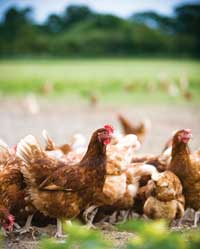Supermarkets lobbied to stock slow growing chicken

The RSPCA is calling on supermarkets to replace faster growing breeds of chicken with more slow growing birds.
RSPCA senior chicken welfare scientist Dr Marc Cooper said the move towards slower growing birds was part of the process of achieving higher welfare conditions.
“We are asking all UK supermarkets to take the next vital step and commit to only using a genetically slower growing breed for all chicken, in line with the requirement that already exists under the Freedom Food scheme,” Dr Cooper said.
“Science and practical experience clearly demonstrate that this would lead to an even greater improvement in the welfare of many millions of chickens.”
To support the call the charity has used data from a Kantar Worldpanel report which revealed a £55.2m increase in spending on Freedom Food labelled chicken, up from £16.4m to £71.6m since March 2009.
Dr Cooper said retailers were doing well in providing options for consumers to buy higher welfare birds but more could be done.
“We’ve seen an incredible commitment from supermarkets like Sainsbury’s, Tesco and Morrisons to improving the lives of chickens but there is still a way to go in our mission to see improvements for the vast majority of chickens reared for meat,” he said.
But Robert Newbery, the NFU’s chief poultry adviser, said he believes the increase in Freedom Food sales is mainly due to a “downshift” by producers from more expensive production methods such as organic or free range towards Freedom Foods standards.
“I think what we’ve seen is an overall downshift through the categories, so organic suffered very heavily and they dropped into free range and free range dropped into Freedom Food and we’ve seen quite a lot of migration from standard into value,” Mr Newbery said.
“A lot of people (consumers) have had to shift down out of organic into free range, out of free range into Freedom Foods.”
Lower welfare “standard” chicken took a downturn, dropping more than £26m but still remaining dominant in market share with £1.12bn in sales, the Kantar Worldpanel data shows.
